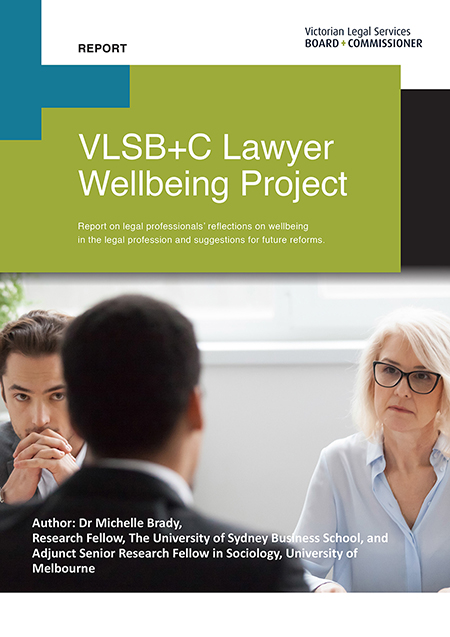- PDF doc
- 1.18 MB
In 2019 we launched our Lawyer Wellbeing Project with the aim of deepening our understanding of lawyers’ experience of mental health and wellbeing across their careers. We interviewed 37 people working across the profession, including law students, early career lawyers, solicitors, barristers and retired and current judicial officers, as well as those working in organisations involved in the regulation and training of legal professionals.
Poor wellbeing is a barrier to lawyers being able to do their jobs and provide access to quality legal services to Victorian consumers. This is of concern to us as the regulator of the profession.
Report summary
The report makes four major findings:
- participants described being acculturated* early in their career into a professional culture that frequently made it very difficult for the average individual to achieve wellbeing
- respondents identified a range of cultural and institutional factors that made it hard to improve the wellbeing of legal professionals
- respondents were positive about the direction of change in recent years and most, though not all, respondents conveyed optimism about a changing conversation regarding the wellbeing of legal professionals
- there are many ideas and suggestions for changes that could improve wellbeing within the profession.
Overall, research has consistently found that rates of psychological distress are relatively high across the legal profession, with rates of depression appearing to be particularly high among law students, solicitors and barristers. Behind these figures is not only a story of often profound impacts on individuals and their families, but also one of significant financial costs for employers.
Some of the suggestions for improving wellbeing included embracing more comprehensive assistance programs like those in place overseas, increased collaboration with researchers, the increased promotion of counselling and debriefing programs, reforms to court practices, improved management training and the incorporation of a focus on wellbeing into CPD requirements.
Ultimately, our aim is to work with the legal profession over the coming years to shift the conversation about lawyer wellbeing away from an emphasis on personal resilience, to highlight the systemic drivers of poor wellbeing and identify what changes might be needed to improve wellbeing outcomes.
We encourage you to read the report, which includes information about the key wellbeing issues faced by lawyers, along with suggestions for how wellbeing in the legal profession could be improved.
You can download the report here.
*Acculturate: to assimilate to a different culture, typically the dominant one.
Interview methodology
While our report is based on semi-structured interviews with a relatively small – though diverse – group of individuals, many other studies have highlighted poor wellbeing as an issue of concern in the profession.
The interviews were conducted by VLSB+C staff using eight open-ended questions. These questions addressed interviewees’ career paths to date, the challenges they have faced and mechanisms for coping with these, their stakeholders, how they and others will evaluate their success in the near future and any other reflections on the conversation. Notes were taken from the interviews and the analysis of these notes was informed by the Framework method, which is a widely used approach to qualitative data analysis for applied research.
The themes in these interviews were analysed by Dr Michelle Brady, Research Fellow, The University of Sydney Business School, and Adjunct Senior Research Fellow in Sociology, University of Melbourne.
